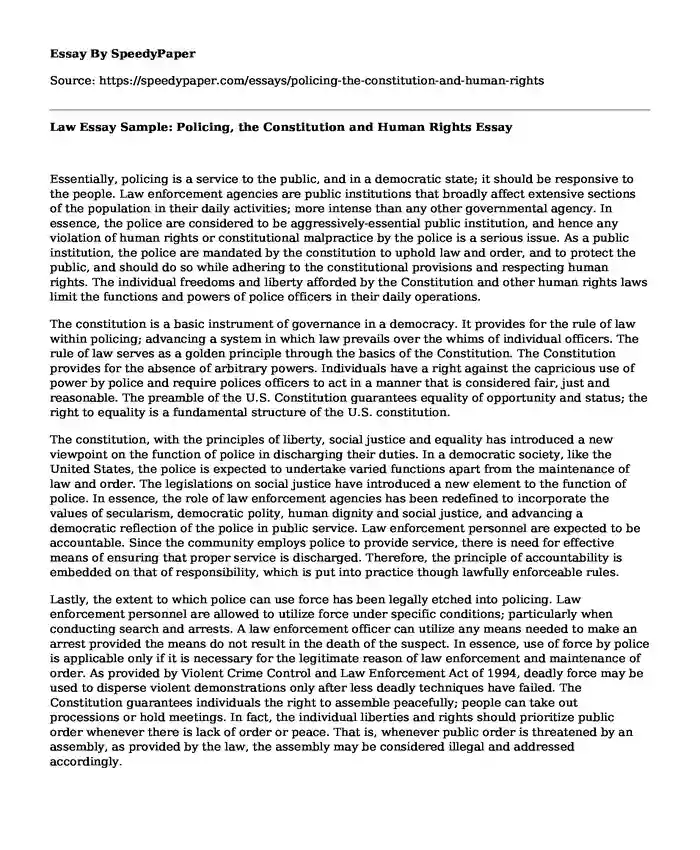
| Type of paper: | Essay |
| Categories: | Policy Law Constitution Human rights |
| Pages: | 3 |
| Wordcount: | 635 words |
Essentially, policing is a service to the public, and in a democratic state; it should be responsive to the people. Law enforcement agencies are public institutions that broadly affect extensive sections of the population in their daily activities; more intense than any other governmental agency. In essence, the police are considered to be aggressively-essential public institution, and hence any violation of human rights or constitutional malpractice by the police is a serious issue. As a public institution, the police are mandated by the constitution to uphold law and order, and to protect the public, and should do so while adhering to the constitutional provisions and respecting human rights. The individual freedoms and liberty afforded by the Constitution and other human rights laws limit the functions and powers of police officers in their daily operations.
The constitution is a basic instrument of governance in a democracy. It provides for the rule of law within policing; advancing a system in which law prevails over the whims of individual officers. The rule of law serves as a golden principle through the basics of the Constitution. The Constitution provides for the absence of arbitrary powers. Individuals have a right against the capricious use of power by police and require polices officers to act in a manner that is considered fair, just and reasonable. The preamble of the U.S. Constitution guarantees equality of opportunity and status; the right to equality is a fundamental structure of the U.S. constitution.
The constitution, with the principles of liberty, social justice and equality has introduced a new viewpoint on the function of police in discharging their duties. In a democratic society, like the United States, the police is expected to undertake varied functions apart from the maintenance of law and order. The legislations on social justice have introduced a new element to the function of police. In essence, the role of law enforcement agencies has been redefined to incorporate the values of secularism, democratic polity, human dignity and social justice, and advancing a democratic reflection of the police in public service. Law enforcement personnel are expected to be accountable. Since the community employs police to provide service, there is need for effective means of ensuring that proper service is discharged. Therefore, the principle of accountability is embedded on that of responsibility, which is put into practice though lawfully enforceable rules.
Lastly, the extent to which police can use force has been legally etched into policing. Law enforcement personnel are allowed to utilize force under specific conditions; particularly when conducting search and arrests. A law enforcement officer can utilize any means needed to make an arrest provided the means do not result in the death of the suspect. In essence, use of force by police is applicable only if it is necessary for the legitimate reason of law enforcement and maintenance of order. As provided by Violent Crime Control and Law Enforcement Act of 1994, deadly force may be used to disperse violent demonstrations only after less deadly techniques have failed. The Constitution guarantees individuals the right to assemble peacefully; people can take out processions or hold meetings. In fact, the individual liberties and rights should prioritize public order whenever there is lack of order or peace. That is, whenever public order is threatened by an assembly, as provided by the law, the assembly may be considered illegal and addressed accordingly.
Bibliography
Congress, U. S. "Violent Crime Control and Law Enforcement Act of 1994." Public law (1994): 103-322.
Schmalleger, Frank. Criminal justice today: An introductory text for the 21st century. Upper Saddle River, NJ: Pearson Prentice Hall, 2009.
Watkin, Kenneth. "Controlling the use of force: a role for human rights norms in contemporary armed conflict." American Journal of International Law (2004): 1-34.
Wilkinson, J. Harvie. "The Dimensions of American Constitutional Equality." Law and Contemporary Problems 55, no. 1 (1992): 235-251.
Cite this page
Law Essay Sample: Policing, the Constitution and Human Rights. (2019, Sep 02). Retrieved from https://speedypaper.net/essays/policing-the-constitution-and-human-rights
Request Removal
If you are the original author of this essay and no longer wish to have it published on the SpeedyPaper website, please click below to request its removal:
- The Breakfast Club Characters Analysis - Free Essay in Adolescent Psychology
- Free Essay Example on Leadership and Health Care Administration
- Essay Example on Communication of Emotions
- Behavioral Psychology Essay Sample
- Cancer Screening Essay Sample
- Essay Sample: Correctional Personnel and the Public Image of Corrections
- Model of Marketing Performance Outcome Chain. Free Essay
Popular categories




